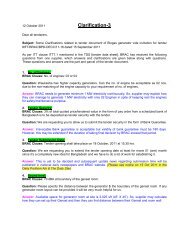Decision-makingUsing evidence forpolicy-making in <strong>health</strong>Article by Tikki PangHow is evidence used in policy-making in <strong>health</strong>? Theanswer <strong>to</strong> this fundamental question requires anappreciation of <strong>the</strong> different mindsets, mentalities<strong>and</strong> “world views” of researchers <strong>and</strong> public policy-makers,<strong>and</strong> how <strong>the</strong>se conditions influence <strong>the</strong> way <strong>the</strong>y work, or donot work, <strong>to</strong>ge<strong>the</strong>r. An insight in<strong>to</strong> this key dynamic <strong>the</strong>nallows consideration of various possible solutions on how <strong>to</strong>improve this critical relationship so that scientific evidencemay truly drive <strong>and</strong> inform <strong>health</strong> decision- <strong>and</strong> policy-making.Goals, priorities, attitudes <strong>to</strong>wards information, timepressures, accountability mechanisms <strong>and</strong> career paths tend<strong>to</strong> be different between researchers <strong>and</strong> policy-makers. Theyoften distrust one ano<strong>the</strong>r’s motives, lack respect for eacho<strong>the</strong>r, have different views on <strong>the</strong> production <strong>and</strong> use ofevidence, different accountabilities, <strong>and</strong> disagree on <strong>the</strong>fundamental issue of whe<strong>the</strong>r <strong>the</strong>re should be a link betweenscience <strong>and</strong> policy. Some possible solutions can be putforward <strong>to</strong> improve <strong>the</strong> use of evidence in policy-making:using knowledge “brokers” (translational researchers), new<strong>and</strong> better incentives <strong>to</strong> encourage researchers <strong>and</strong> policymakers<strong>to</strong> work <strong>to</strong>ge<strong>the</strong>r, organizational capacity-building <strong>and</strong>embedding research in implementation, utilizing a broaderdefinition of research, re-defining <strong>the</strong> starting point forknowledge transfer, <strong>and</strong>, finally, acknowledging that policymakingis a highly complex process.In <strong>the</strong> face of continuing global <strong>health</strong> challenges, times ofscarce resources <strong>and</strong> competing priorities, <strong>the</strong> use ofevidence <strong>to</strong> inform policy-making becomes a moral <strong>and</strong>ethical responsibility <strong>and</strong> should be <strong>the</strong> key driver forimproving <strong>health</strong> system performance.Researchers <strong>and</strong> policy-makers are differentcreatures living in different worldsDespite <strong>the</strong> intuitive, logical assumption that scientificevidence should au<strong>to</strong>matically inform policy, <strong>the</strong>re areproblems in implementation <strong>and</strong> evidence-based policy is agoal which is not always <strong>reach</strong>ed 1-5 . Many researchers aresceptical about <strong>the</strong> extent <strong>to</strong> which research is used, <strong>and</strong>, inturn, many policy-makers are sceptical about <strong>the</strong> usefulnessof research in general. The causes for <strong>the</strong> disconnect arecomplex but are probably related <strong>to</strong> some key fac<strong>to</strong>rsincluding <strong>the</strong> fact that researchers <strong>and</strong> policy-makers havedifferent goals, speak different “languages” <strong>and</strong> have differenttime frames for <strong>the</strong>ir work.A researcher has, as his primary goal, <strong>the</strong> generation ofnew knowledge <strong>and</strong> <strong>the</strong> advancement of science. She/heoften <strong>measures</strong> success through <strong>the</strong> publication of scientificpublications in peer-reviewed academic journals, with thisactivity often used as <strong>the</strong> primary criteria for careeradvancement (<strong>the</strong> “publish or perish” syndrome). They areoften less interested in broader issues, for example, <strong>the</strong> “bigpicture”<strong>social</strong> or policy aspects <strong>and</strong> impact of <strong>the</strong>ir work. Theobjective in <strong>the</strong> research world is “publications, patents, <strong>and</strong>professorships” 6 . Given <strong>the</strong> unprecedented rate of increase inknowledge, researchers tend <strong>to</strong> become extremely specialized<strong>and</strong> narrow in <strong>the</strong>ir field of research, often resulting in o<strong>the</strong>rs(researchers <strong>and</strong> non-researchers alike) not able <strong>to</strong> fullyunderst<strong>and</strong> or appreciate <strong>the</strong> importance of <strong>the</strong>ir work. Theyaspire <strong>to</strong> become an “expert/professor/specialist” <strong>and</strong> worklargely according <strong>to</strong> a rational, intellectual model.In contrast <strong>to</strong> this desire for recognition by peers, <strong>the</strong> goalof policy-makers is <strong>to</strong> obtain popular support. Much of <strong>the</strong>irdaily work is <strong>to</strong> “put out fires” <strong>and</strong> manage political crises <strong>and</strong><strong>the</strong>y are thus more interested in broader issues, e.g. solutionsthat can be generally applied <strong>to</strong> a wide variety of problems<strong>and</strong> which are politically acceptable. So, in contrast <strong>to</strong> <strong>the</strong>research community, <strong>the</strong> key considerations in <strong>the</strong> policyworld is “policy, practice, <strong>and</strong> people” 6 . Because of timepressures <strong>and</strong> lack of necessary skills policy-makers havevery little time <strong>to</strong> read or evaluate original scientificpublications of primary research. Instead, <strong>the</strong>y prefer <strong>to</strong> readshort summaries or even just “bullet points”. They strive<strong>to</strong> become a “Mr/Ms Fix-it <strong>and</strong> Jack of all trades”, <strong>and</strong> betterstill is if <strong>the</strong>y can do this across different portfolios. Theysearch for compromise <strong>and</strong> rapid fixes, by using an intuitive,visceral model.Research researchers speak <strong>the</strong>ir own language whichnormally consists of at least some Greek letters <strong>and</strong>ma<strong>the</strong>matical symbols. Their language often requires“translation” before it can be unders<strong>to</strong>od by non-researchers,154 ✜ Global Forum Update on Research for Health Volume 4
Decision-makingPolicy-makersComplex policy problemsFocused solutionsReducing uncertaintiesSpeedControl <strong>and</strong> delayManipulationFeasible <strong>and</strong> pragmatic solutionsResearchersSimplification of <strong>the</strong> problemInterest in related but separatedissuesFinding <strong>the</strong> truthTime <strong>to</strong> thinkPublish or perilExplanationThoughtful deliberationsSource: Bensing JM. Doing <strong>the</strong> right thing <strong>and</strong> doing it right: <strong>to</strong>ward a framework forassessing <strong>the</strong> policy relevance of <strong>health</strong> service research. International Journal ofTechnology Assessment in Health Care, 2003, 19:604-512.Table 1: Conflicting interests of policy-makers <strong>and</strong> researchersor even fellow researchers in a different field. Researchersoften add a st<strong>and</strong>ard clause at <strong>the</strong> end of <strong>the</strong>ir papers statingthat “our research indicates that more research is needed”.This is, of course, both exculpa<strong>to</strong>ry (“don’t blame me if thisisn’t correct”) <strong>and</strong> self-serving (“but if you give me moremoney I might be able <strong>to</strong> give you a better answer”). Hereinlies a key point of distrust: policy-makers believe thatresearchers do research primarily <strong>to</strong> generate more fundingfor more research, <strong>and</strong> not for <strong>the</strong> potential value of <strong>the</strong>research <strong>to</strong> society.“Policy speak” is often used <strong>to</strong> describe <strong>the</strong> language whichpolicy-makers use <strong>and</strong> it often contains acronyms, which inturn are defined by o<strong>the</strong>r acronyms. Much of <strong>the</strong>communication is confidential in nature <strong>and</strong> for a closedaudience, <strong>and</strong> driven by unpublicized political agendas. Theyoften include multiple signatures or are anonymous(containing no signatures), <strong>and</strong> are often stamped as“confidential”. While policy-makers do sometimes conductresearch, it is rare <strong>to</strong> see <strong>the</strong>ir findings published in peerreviewedscientific journals, if released at all. In general, <strong>the</strong>culture of open sharing of knowledge <strong>and</strong> information is notpart of <strong>the</strong> policy-making world.Scientific research in general is driven by fairly long timeframes. Researchers want time for contemplation, thinking,formulating hypo<strong>the</strong>ses, analysis, syn<strong>the</strong>ses, talking <strong>to</strong>colleagues <strong>and</strong> more reflection. In general, it is believed that<strong>the</strong> longer it takes <strong>to</strong> do a research study, <strong>the</strong> better <strong>the</strong>research quality. It is also a fact that <strong>the</strong> process of science isa cumulative one <strong>and</strong> builds on <strong>the</strong> previous work of o<strong>the</strong>rs.Many researchers spend <strong>the</strong>ir entire research career in onenarrow subject area, in order <strong>to</strong> build up <strong>the</strong>ir expertise <strong>and</strong>track record, as well as national <strong>and</strong> international reputationin that area – <strong>to</strong> many, this is an end in itself.In contrast, policy-makers work <strong>to</strong> a very different, muchshorter time scale, often a matter of days or weeks. Answersare always needed instantly <strong>and</strong> <strong>the</strong> time pressures often takeprecedence over quality, since <strong>the</strong>y must have prompt <strong>and</strong>firm opinion <strong>to</strong> look credible. This is reflected in <strong>the</strong> classicpolicy-makers’ sentiment, “I have made up my mind, don’tconfuse me with <strong>the</strong> facts”. Policy-makers usually haveshort tenure managing projects, <strong>and</strong> will move on quickly<strong>to</strong> o<strong>the</strong>r responsibilities, in order <strong>to</strong> build up <strong>the</strong>ir reper<strong>to</strong>ireof expertise in a wide variety of different areas. Theconflicting interests of policy-makers <strong>and</strong> researchers is givenin Table 1.Why are <strong>the</strong>y different?The incompatibilities between researchers <strong>and</strong> policy-makerslead <strong>to</strong> very real problems in terms of promoting better useof evidence for <strong>health</strong> policy development. If <strong>the</strong>y are <strong>to</strong>work <strong>to</strong>ge<strong>the</strong>r, researchers <strong>and</strong> policy-makers must knoweach o<strong>the</strong>r’s strengths <strong>and</strong> weaknesses, as well as likes <strong>and</strong>dislikes. There are a number of key issues that must <strong>the</strong>reforebe addressed.Researchers <strong>and</strong> policy-makers often lack trust <strong>and</strong> respectfor <strong>the</strong> respective roles that <strong>the</strong>y play. Researchers often havea “superiority complex” which translates in<strong>to</strong> acondescending attitude <strong>and</strong> a lack of respect for those whoare not researchers. They often take <strong>the</strong> view that <strong>the</strong>irresearch is <strong>to</strong> be reviewed only by <strong>the</strong>ir peers <strong>and</strong> find itdifficult <strong>to</strong> conduct “directed” or “applied” research,regardless of <strong>the</strong> potential benefits <strong>to</strong> society in general. Theyconsider “academic freedom” <strong>to</strong> be sacrosanct <strong>and</strong> expect <strong>to</strong>be allowed <strong>to</strong> pursue <strong>the</strong>ir interests with no constraints.Therefore, <strong>the</strong>y often resent <strong>the</strong> power of policy-makers <strong>to</strong>control research funding <strong>and</strong> <strong>the</strong> frequent misuse that ismade of scientific data <strong>to</strong> fulfil a politically-driven policyagenda. At <strong>the</strong> same time, policy-makers resent <strong>the</strong> arroganceof researchers, <strong>the</strong> seeming self-fulfilment <strong>and</strong> self-servingnature of much of <strong>the</strong>ir research, <strong>and</strong> <strong>the</strong>ir narrow, tunnelvision approach <strong>to</strong> <strong>the</strong> world. Scientific input is oftenuntimely, less-than-relevant, abstract <strong>and</strong> impossible <strong>to</strong>underst<strong>and</strong> or contextualize. In extreme situations, <strong>the</strong>y viewscientific evidence as being detrimental <strong>to</strong> political <strong>and</strong>economic considerations, e.g. when evidence of an infectiousdisease outbreak can lead <strong>to</strong> economic loss as a result ofreduced numbers of <strong>to</strong>urists.In addition, researchers <strong>and</strong> policy-makers often havedifferent views as <strong>to</strong> what constitutes evidence. Manyscientific results are quantitative <strong>and</strong> can be assessed inrigorous, repeatable ways. Researchers obsess aboutresearch methodology <strong>and</strong> <strong>the</strong> “levels of evidence” ga<strong>the</strong>redthrough different study designs, such as clinical trials <strong>and</strong>observational studies. Policy-makers, on <strong>the</strong> o<strong>the</strong>r h<strong>and</strong>, areoften more informal in <strong>the</strong>ir assessment of information, eventhat of a quantitative nature. They look for importantinformation based on quick reflections of reality for policymaking,e.g. poll results, opinion surveys, focus groups inmarginal elec<strong>to</strong>rates, anecdotes <strong>and</strong> real-life s<strong>to</strong>ries. Theyoperate on a different hierarchy of evidence – <strong>the</strong>ir “levels ofevidence” may range from “any information that establishes afact or gives reason for believing in something” <strong>to</strong> “availablebody of facts or information indicating a belief or propositionis true or valid”.Should researchers cater <strong>to</strong> <strong>the</strong> needs of policy-makers?Policy-makers are often frustrated because researcherscannot give <strong>the</strong>m a quick, clear <strong>and</strong> simple answer.Researchers are frustrated because required data may notexist, or <strong>the</strong>y do not know <strong>the</strong> answer or want <strong>to</strong> admitproblems with <strong>the</strong>ir studies, or <strong>the</strong>y cannot explain <strong>the</strong>ircomplex findings in a simple language. Policy-makers believethat much of <strong>the</strong> research being conducted is pointless <strong>and</strong>lacks relevance, which is probably right as <strong>the</strong> motivation on<strong>the</strong> part of <strong>the</strong> researchers is often scientific curiosity <strong>and</strong> <strong>the</strong>Global Forum Update on Research for Health Volume 4 ✜ 155



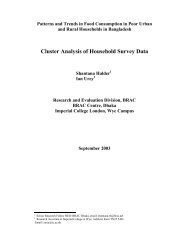
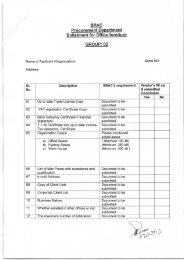
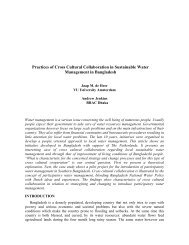
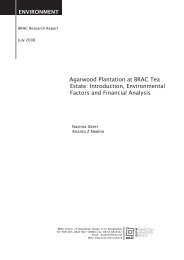
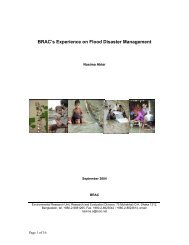
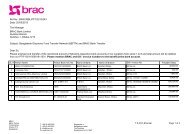
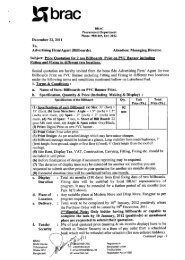
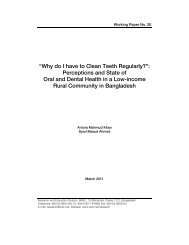
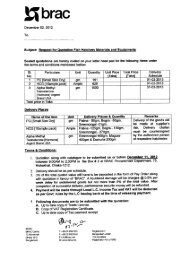
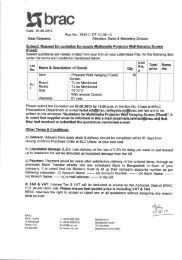
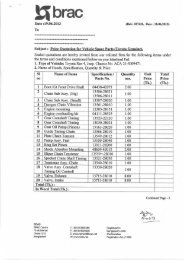
![[re-tender] RFQ for supply of Diesel Generator - Brac](https://img.yumpu.com/44421374/1/186x260/re-tender-rfq-for-supply-of-diesel-generator-brac.jpg?quality=85)
